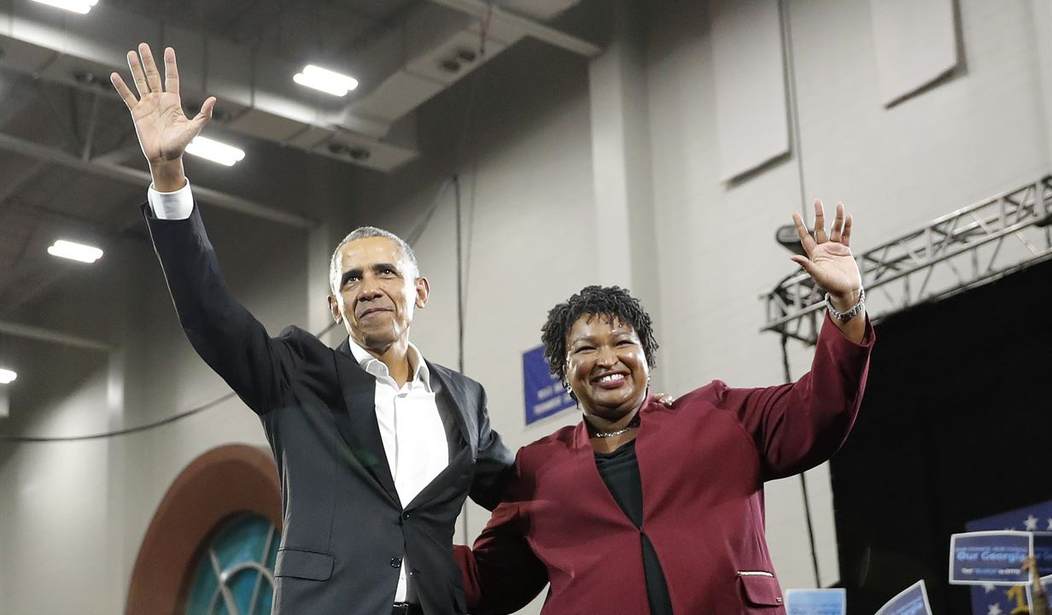For more than two years, voters have heard Democrats accuse Republicans of trying to undermine confidence in the American democratic system.
The charge was thrown about repeatedly in the 2016 presidential election, when Democrats said then-candidate Donald Trump's contention that the election might be "rigged" would undercut faith in the system. Democrats, and many in the media, pressed Trump to promise to accept the election results. (When Trump won, the question was turned around, and Democrats were the ones who had difficulty accepting the voters' decision.)
This year, during campaigning for midterm elections, some Democrats again charged that Republicans were trying to undermine the electoral system by suppressing the vote in key races. The talk was particularly intense during the governor's race in Georgia.
Well before Election Day, Democrat Stacey Abrams accused her Republican opponent, Georgia Secretary of State Brian Kemp, of using his office to throw minority voters off the rolls.
"He disproportionately purged voters of color," Abrams said on "The View" about a week before the election. "That's problematic because, regardless of intent, the result is that racial bias has been injected into our system and undermines confidence in our democracy."
After the voting, some of Abrams' supporters openly accused Kemp of rigging the election.
"I think that Stacey Abrams' election is being stolen from her," said New Jersey Democratic Sen. Cory Booker.
"If Stacey Abrams doesn't win in Georgia, they stole it," said Ohio Democratic Sen. Sherrod Brown.
"If she had a fair election, she already would have won," said Hillary Clinton.
But even as Booker, Brown and Clinton spoke, Kemp's lead over Abrams was in the tens of thousands of votes. By the final count, Kemp received 54,723 more votes than Abrams did.
Recommended
Most Abrams supporters did not suggest that she actually won more votes than Kemp. Instead, they pointed to Georgia's requirement that the winning candidate must receive more than 50 percent of the vote to avoid a runoff.
The Abrams scenario was based on the hope that somehow Abrams might find an additional 17,000 or so more votes, while Kemp got no more, and then Kemp, while still substantially ahead in total votes, would have less than 50 percent of the total. If that happened, there would be a runoff with Abrams.
The only problem was, the numbers weren't anywhere close to what Abrams needed.
Still, the Abrams team insisted the vote was rigged. "We believe that Brian Kemp mismanaged this election to sway it in his favor," said Lauren Groh-Wargo, Abrams' campaign manager. Kemp, she said, would "stop at nothing to undermine democracy and attempt to steal this election."
Neither Abrams nor her supporters have presented evidence to prove their claim that there were tens of thousands of Georgians who wanted to vote for her but were disenfranchised by Kemp's efforts. Most reports to that effect were anecdotal and simply suggested that there was a big Abrams voter bloc that was not being allowed to cast a ballot.
Specifically on the issue of voter names being removed from rolls, Georgia's law provided for the state to send a letter to voters who have not voted in three years. If they respond, then they stay on the rolls. If they don't respond, and if they don't vote, they still stay on the rolls for two more federal election cycles -- four years -- before their names are removed. It's a seven-year process, the kind that has been upheld as constitutional by the Supreme Court. Voters in the midst of that process could vote in the governor's race. And focusing on the removals ignored the fact that Georgia's voter rolls have been growing steadily, as has minority turnout.
After the voting results became indisputably clear, Abrams finally ended her effort, saying that under "the law as it stands," Kemp "received an adequate number of votes to become the governor of Georgia." But she refused to recognize the election result as legitimate.
Nor did some of her supporters. Indeed, if one sets aside the Russian effort to disrupt the 2016 election, the statements of Abrams and her supporters after the Georgia election stand as some of the most powerful efforts to undermine confidence in the American democratic system in recent years.
"This is not a speech of concession, because concession means to acknowledge an action is right, true or proper," Abrams said in the speech in which she announced the end of her campaign. "Make no mistake: the former secretary of state was deliberate and intentional in his actions. I know that eight years of systemic disenfranchisement, disinvestment and incompetence had its desired effect on the electoral process in Georgia."
With another presidential election less than two years away, such talk will only increase. And more Democrats will surely accuse Republicans of trying to undermine faith in the electoral process. But Georgia proved that Democrats have done plenty of undermining themselves.
Byron York is chief political correspondent for The Washington Examiner.

























Join the conversation as a VIP Member